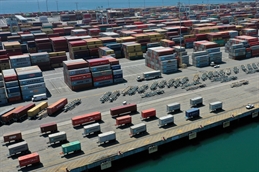
The Department of Transportation is awarding US$241 million to United States ports to boost their operations as the country continues to deal with supply chain disruptions.
The grant will help improve infrastructure in the ports to speed the flow of goods in and out of the gateways. It will is being made available to 25 projects across 19 states.
"US maritime ports play a critical role in our supply chains," said Pete Buttigieg, United States secretary of transportation. "These investments in our nation's ports will help support American jobs, efficient and resilient operations and faster delivery of goods to the American people."
In 2022, the budget for port improvements will double to US$450 million in grants annually for five years under the new infrastructure law being pushed by the Biden administration.
President Joe Biden said on December 22 that the grants will help alleviate supply chain bottlenecks in the short and long term.
The grant includes US$52.3 million to help boost rail capacity at the port in Long Beach in California with a new locomotive facility, 10,000-foot support track and extensions of five existing tracks to speed up freight movement while cutting down the number of truck trips required to do that.
The other port recipients include US$20 million for Portsmouth, Virginia to help build out a supply chain for the offshore wind industry; another US$14.6 million has also been earmarked for Brunswick, Georgia to build a fourth berth for cargo ships at Colonel's Island Terminal.
Houston has also been granted US$18.3 million, to help pay for a 39-acre greenspace at the Bayport Container Terminal; and Tell City, Indiana with US$1.6 million, to construct a 40-foot diameter pier on the Ohio River that can be used direct barge-to-truck unloading of cargo.
Delcambre, Louisiana will also get US$2 million, for dock restoration and climate resiliency.
"Ports are economic engines of their local communities and play a crucial role in our nation’s supply chains. The more than US$240 million in funding announced today will strengthen our competitiveness and make our supply chains more resilient for years to come," the US Transportation Department said in a Twitter post.



